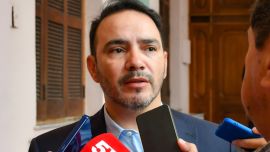Tens of thousands took to the streets of Buenos Aires and capital cities across Latin America Thursday to mark International Women's Day and protest against gender-based violence.
"A beautiful woman is one who marches" said one of the many placards held above the densely packed, slow-moving crowds of demonstrators in the Argentine capital.
"We have to make a lot of noise. Over here, we have to be everything, not just women. This day should be a national holiday," said nurse Claudia Morales, accompanied by her two teenage daughters, as the throngs neared Congress.
Other women held babies in their arms or pushed strollers, while teenage girls held banners reading "My mum taught me to fight."
The overall aim of the march was to protest violence against women, in a country of 42 million which logged 292 murders of women in 2017 – a number that places Argentina at the lower end of the scale when it comes to "femicide" compared to other Latin American countries.
But this year, it also gained strength as a show of support for a bill to legalize abortion in the first 14 weeks of pregnancy. Terminations are currently only permitted in cases of rape or if a woman's health is in danger.
Argentina became a regional leader in combating violence against women when the Ni Una Menos movement enjoyed a surge of support in 2015. Since then, activism has spread across the country.
In Mexico, where an average of 7.5 women are killed every day, thousands of protesters were expected to march later Thursday to the iconic Ángel statue in the center of the capital.
'Deliberate slaughter'
"It's difficult to talk about it," said Paula, a mother of five, recounting a decade of physical abuse at the hands of her former partner. "I have been through all the legal proceedings."
"I went to the police when he hit my daughter, who was nine at the time and who is his daughter too. But lawsuits need to be paid for. I have five kids with him, two of them have disabilities," said the activist, a slight woman who speaks in a slow, deliberate manner.
"He was the first man who hit me, and the last," said Paula firmly. "He is now in prison, and the trial begins in June."
There were also some men in the march, though not many. One of them, Gustavo Melmann, was the father of Natalia, whose murder in 2001 was one of the first femicides to really shock the country. He insisted that "this deliberate slaughter must end."
Three other men marched in what they called "masks of shame for what the patriarchy has done."
Decriminalise abortion
The decriminalisation of abortion was another rallying cry for a march that took place in El Salvador, which has some of the harshest punishments for abortion in the world.
At the front of the march was Teodora Vásquez, who in February was released after almost 11 years in jail for aggravated murder, following a stillbirth. She denied the charges against her.
"Abortion must be decriminalised because many women facing medical obstetric emergencies are accused of crimes and put in jail where they languish unjustly," said Vásquez.
In Honduras, feminist groups demanded justice for environmental activist Berta Cáceres, who was murdered two years ago in her home after years of death threats.
Nine people have been detained in that murder investigation, including Roberto Castillo, a former military intelligence officer who had graduated from the US military academy at West Point, and who was detained as he tried to leave the country last week.
Castillo, who is charged with being the "intellectual author" of the murder, was the president of an energy company building a dam that Caceres was lobbying against.























Comments